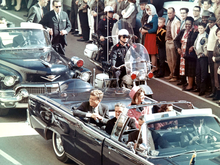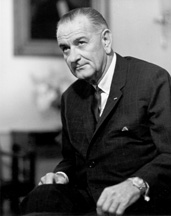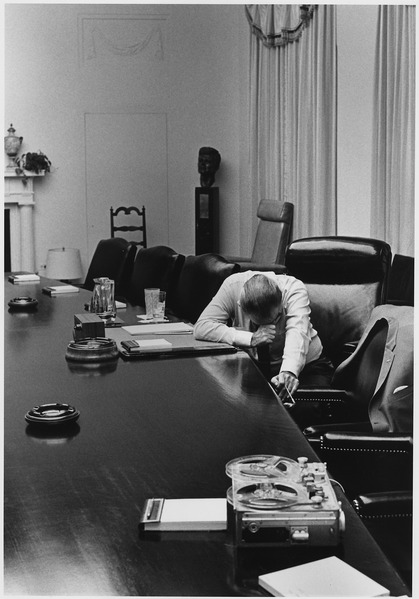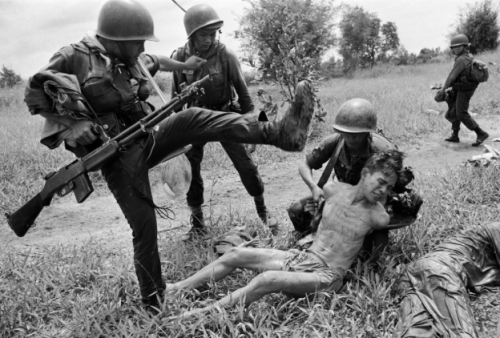shiftygiant
Gone Fishin'
Hi, I'm shiftygiant, and I would like to present a very strange scenario (and my first in fact). It is a recursive TL of sorts, the subject matter of which will become clear in a moment...
November 22nd, 1963
Dallas, Texas
Early afternoon on a Tuesday. The Texas sun of late November hangs lazily overhead and The President, sitting next to his wife and with the Governor, is riding in a motorcade, having just turned of Houston and about to turn into Elm, waving to passer-byes sitting on grassy knolls in the Dealey Plaza [1].
Meanwhile, sat in a window of the Dallas Book Depository and overlooking the street, a young man is slowly taking aim of the President. Lee Oswald [2], a worker at the book depository, having come in this morning with a bag he said was wire hangers, has his finger on the trigger of a rifle he got in the mail, cheek resting on it's butt, eye down the scope and sights on the President.
The President smiles as he waves to the crowd, a camera filming the event silently from one of the concrete pedestals along Elm Street.
A thousand faces line the street, smiling and waving, camera's flashing as they try and capture history.
With bated breathe, Lee squeezes the trigger.
The first round slams into Kennedy’s chest, a shot echoing in the arid sky. Folding, the President pushed a clenched first to his chest, his wife, in confusion, propping him up as he goes to fall. Bringing his head back, Kennedy screams in anguish as blood comes from between his knuckles.
A second shot rings out, missing Kennedy but striking Governor Connolly. As Connolly grasps at his neck, slipping into shock with blood trickling between his fingers, Secret Service agents dash to the car to secure the President.
Lee sighs and pulls the bolt back, a shell spitting out. Slamming it back, he locks the next round and squeezes. The third shot hits the President in the head, just above the eye. Matter explodes from behind him as the Agents jump onto the limo, which quickly drives off, speeding down towards the Elm Street overpass. Lee dashes from the room, down the corridor and out the building as people evacuate out of fear of the gunman. Walking away, he heads home.
The Limo makes its way to Parkland, the closest Hospital en-route. The President is declared DOA. Vice-President Johnson, who had been riding in the convoy, is rushed to a small room with the Press Sectary Kilduff and Kennedy’s traumatized wife, along with his own wife. With the body of the President to stay in Dallas for the Dallas Coroner[3], Johnson requests that Federal Judge Sarah T. Hughes[4] is brought to Parkland for his inauguration. The press is given access to a classroom, where they are addressed by Kilfuff, who informs them of the Presidents assassination. Hughes arrives shortly thereafter with a photographer where, after being briefed of what’s happened, swears Vice-President Johnson in as President of the United States.
1-Kennedy is on his way to the Trade Mart in Dallas, where he delivered his famous speech 'The Watchman Waketh' on November 22nd, 1963.
2-A fairly obscure figure outside of Texas, Lee Oswald was a former Marine who had lived for some years in the Soviet Union. Arrested whilst preparing to shoot the President, he was convicted of conspiracy to murder Kennedy, as well as his earlier attempted murder of General Edwin Walker, given life imprisonment. It’s conceivable that had he made it to the sixth floor, he would have had the perfect position to fire on the President. A designated Sharpshooter, it’s not hard to imagine what kind of damage he could have done.
3-Shooting the President would have been considered a state crime, therefore would have been subject to a Dallas based investigation.
4-A future Associate Justice, Hughes was a friend of Johnson, as well as one of the few judges he liked in Dallas. It's not hard to see why he would turn to her for such a job.
+x+x+x+x+x+x+x+x+x+x+x+x+
THE WATCHMAN WAKETH
Part One: Death of a President

THE WATCHMAN WAKETH
Part One: Death of a President

November 22nd, 1963
Dallas, Texas
Early afternoon on a Tuesday. The Texas sun of late November hangs lazily overhead and The President, sitting next to his wife and with the Governor, is riding in a motorcade, having just turned of Houston and about to turn into Elm, waving to passer-byes sitting on grassy knolls in the Dealey Plaza [1].
Meanwhile, sat in a window of the Dallas Book Depository and overlooking the street, a young man is slowly taking aim of the President. Lee Oswald [2], a worker at the book depository, having come in this morning with a bag he said was wire hangers, has his finger on the trigger of a rifle he got in the mail, cheek resting on it's butt, eye down the scope and sights on the President.
The President smiles as he waves to the crowd, a camera filming the event silently from one of the concrete pedestals along Elm Street.
A thousand faces line the street, smiling and waving, camera's flashing as they try and capture history.
With bated breathe, Lee squeezes the trigger.
The first round slams into Kennedy’s chest, a shot echoing in the arid sky. Folding, the President pushed a clenched first to his chest, his wife, in confusion, propping him up as he goes to fall. Bringing his head back, Kennedy screams in anguish as blood comes from between his knuckles.
A second shot rings out, missing Kennedy but striking Governor Connolly. As Connolly grasps at his neck, slipping into shock with blood trickling between his fingers, Secret Service agents dash to the car to secure the President.
Lee sighs and pulls the bolt back, a shell spitting out. Slamming it back, he locks the next round and squeezes. The third shot hits the President in the head, just above the eye. Matter explodes from behind him as the Agents jump onto the limo, which quickly drives off, speeding down towards the Elm Street overpass. Lee dashes from the room, down the corridor and out the building as people evacuate out of fear of the gunman. Walking away, he heads home.
The Limo makes its way to Parkland, the closest Hospital en-route. The President is declared DOA. Vice-President Johnson, who had been riding in the convoy, is rushed to a small room with the Press Sectary Kilduff and Kennedy’s traumatized wife, along with his own wife. With the body of the President to stay in Dallas for the Dallas Coroner[3], Johnson requests that Federal Judge Sarah T. Hughes[4] is brought to Parkland for his inauguration. The press is given access to a classroom, where they are addressed by Kilfuff, who informs them of the Presidents assassination. Hughes arrives shortly thereafter with a photographer where, after being briefed of what’s happened, swears Vice-President Johnson in as President of the United States.
+x+x+x+x+x+x+x+x+x+x+x+x+
1-Kennedy is on his way to the Trade Mart in Dallas, where he delivered his famous speech 'The Watchman Waketh' on November 22nd, 1963.
2-A fairly obscure figure outside of Texas, Lee Oswald was a former Marine who had lived for some years in the Soviet Union. Arrested whilst preparing to shoot the President, he was convicted of conspiracy to murder Kennedy, as well as his earlier attempted murder of General Edwin Walker, given life imprisonment. It’s conceivable that had he made it to the sixth floor, he would have had the perfect position to fire on the President. A designated Sharpshooter, it’s not hard to imagine what kind of damage he could have done.
3-Shooting the President would have been considered a state crime, therefore would have been subject to a Dallas based investigation.
4-A future Associate Justice, Hughes was a friend of Johnson, as well as one of the few judges he liked in Dallas. It's not hard to see why he would turn to her for such a job.
+x+x+x+x+x+x+x+x+x+x+x+x+
Last edited:


